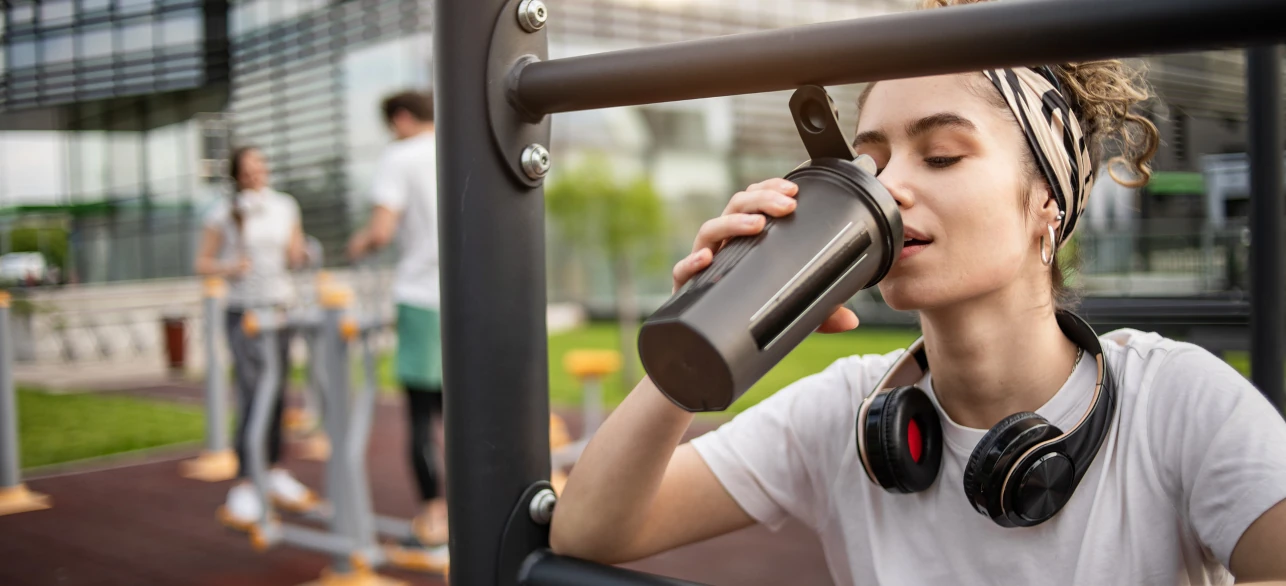If your teens want to build muscle or improve athletic performance, they may ask you for protein powders, drinks, or bars. Protein is a main ingredient needed for muscle building, but more of it isn’t always better!
If you’ve wondered whether these products are safe, or if they even need extra protein, you’re not alone. I’ve gathered answers to the most frequently asked questions I’ve received about protein and teens:
Are Protein Products Safe?
It depends. The FDA does not regulate supplements like protein powders, and they stay on the market until there is a safety concern. So, you’ll need to be careful and read labels. Look for:
- 20 grams of protein per serving. Many products have 40-60 grams per serving, which is too much for teens!
- Pure protein sources like whey, soy, or hemp without added ingredients.
- Third-party certifications to ensure ingredient accuracy, such as Good Manufacturing Practices.
Are Protein Supplements Necessary?
Eating protein powders, bars and drinks can be an excellent addition to an already balanced diet. However, using them alone is not a shortcut to building muscle. It takes a healthy diet, proper exercise, and rest. The United States Olympic Committee is an excellent source for further guidance on nutrition and muscle building.
How Much Protein Do Teens Need Each Day?
- Non-athlete teens: 0.45 g per pound of body weight (e.g., 45 g daily for a 100 lb. teen).
- Teen athletes: 0.6 – 0.8 g per pound of body weight (e.g., 60 – 80 g for a 100 lb. teen).
When should teens eat protein?
- Throughout the day
Teens will see the most benefit if they spread out their protein intake throughout the day. - Following a workout
Athletes should eat a recovery snack within 30 minutes of finishing a workout. This helps with muscle building and recovery. Protein powders and bars can be helpful in this case, especially for athletes who stay after school or live far away from practice. Snacks should include:- 20-25 grams of protein.
- 30-60 grams of carbohydrates.
Why Is Protein Important for Muscle Growth in Athletes?
When teens workout, and especially when they lift weights, they break down tiny fibers in their muscles. Protein helps these torn muscle fibers to rebuild. This rebuilding process, along with taking the right amount of rest and eating a balanced diet, is how muscles grow.
What Are the Best Protein Sources for Teens?
Whole foods are the best choice, such as:
- Meat, nuts, yogurt, cheese, eggs, and beans.
- Snacks like trail mix, beef jerky, chocolate milk, or Greek yogurt.
If they use protein powders, bars or drinks, look for:
- No more than 20 grams of protein per serving.
- Products that also include carbs (need both carbs and protein for recovery).
What Should Teens Avoid?
- Creatine: It can cause dehydration and potential kidney and liver issues. And there have been no long-term safety studies for teens.
- Pre-workout powders/supplements: They’re not necessary. Instead, teens should hydrate and eat quick-digesting carbs like fruit or crackers before a game or workout. Avoid eating too much fiber because it could cause digestive issues.
Can Teens Get Too Much Protein?
Yes! Protein is essential for muscle growth, but eating too much protein can lead to:
- Dehydration.
- Stress on the kidneys and liver.
- Extra fat storage.
- Unwanted symptoms such as nausea, decreased appetite, and diarrhea or constipation.
- Decreased consumption of other important nutrients.
To learn more about sports medicine at Cincinnati Children’s, please call 513-803-4878 or fill out an online form for more information. Our nutrition services can be reached at 513-636-7475 option 1.






